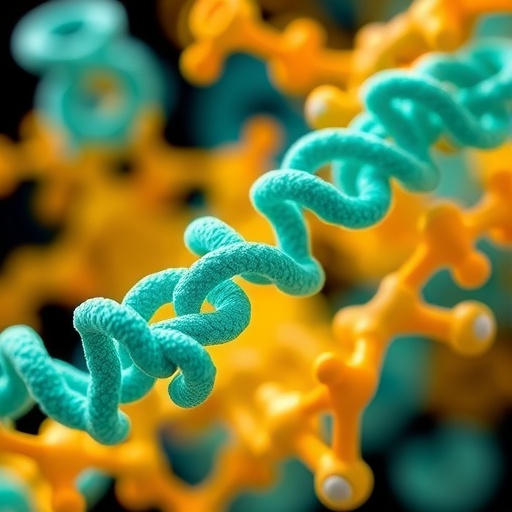Peptides are emerging as promising candidates for targeted therapies, capitalizing on their unique beneficial properties. They are not only more efficient in targeting specific cells but also exhibit superior oral bioavailability and cellular permeability compared to traditional small molecules and biologics. The versatility and specificity of peptides make them an attractive option for innovative drug design, offering a fresh perspective in the biomedical field amidst a growing focus on personalized medicine. A critical advancement in this area has come from recent research utilizing artificial intelligence.
The innovative algorithm dubbed PepMimic is reshaping the landscape of peptide design. This AI-driven tool adeptly transforms known receptor structures or existing antibodies into compact peptide binders. By mimicking the molecular binding interfaces between target proteins and established binders, PepMimic introduces a novel methodology for generating high-affinity peptides. This innovative approach harnesses computational power to mimic complex biochemical interactions, embodying a significant leap forward in the speed and efficiency of peptide discovery.
Given the intricate nature of protein interactions, the application of PepMimic to various drug targets represents a groundbreaking stride. Notable targets such as PD-L1, CD38, BCMA, HER2, and CD4 were selected for this investigational analysis. Utilizing surface plasmon resonance imaging technology, researchers quantifiably assessed the performance of the synthesized peptides. Remarkably, 8% of these novel peptides displayed dissociation constant (KD) values around the 10−8 M level, a promising indication of their binding strength. Furthermore, 26 of these peptides achieved KD values as low as 10−9 M, surpassing the outcomes of random library screenings conducted under identical conditions.
The impressive binding characteristics of these peptides suggest that the PepMimic algorithm can effectively discern and recreate the essential elements that contribute to successful protein-peptide interactions. It is crucial for scientists to identify stable and specific peptide binders, particularly for targets that currently lack available high-affinity binders. This application is particularly noteworthy, as the research community continually seeks novel therapeutic agents that can effectively engage with challenging disease targets.
In instances where available binders were non-existent, PepMimic was employed to create peptides by first designing protein binders using existing computational algorithms. This two-step process not only underscores the adaptability of the PepMimic technology but also highlights its potential to fill critical gaps in the peptide design spectrum. Once the artificial interfaces were simulated, the next phase involved designing peptides that could interact suitably.
The research team thoroughly validated the top-ranked peptides through extensive in vivo studies. Utilizing tail vein injections in various tumor-bearing mouse models, including breast, myeloma, and lung tumors, they examined the efficacy of the newly synthesized peptides. The empirical evidence gathered from these experiments showcased effective membrane binding, bolstering the argument for their potential clinical applicability in diagnostic imaging and targeted therapeutic strategies. As the team delved deeper into the therapeutic potential, the findings indicated not merely binding efficacy, but also the prospect of these peptides as agents capable of delivering therapeutic payloads directly to diseased tissues.
The implications of such research are vast, potentially transforming the treatment modality for various malignancies and chronic diseases. Innovations in peptide design, especially those driven by artificial intelligence, could revolutionize the way biopharmaceuticals are developed, produced, and administered. By translating complex biological interactions into actionable therapeutic designs, researchers can significantly improve treatment outcomes while minimizing side effects and enhancing patient compliance.
As young researchers and seasoned professionals alike explore the potentials of PepMimic, the excitement surrounding peptide-based therapeutics grows exponentially. The ability to efficiently generate high-affinity peptide binders could pave the way for breakthroughs in treating diseases currently considered difficult to target with existing modalities. Furthermore, the intersection of artificial intelligence with peptide therapeutics embodies a collaborative future for technology and biology, creating foundational platforms for next-generation medicinal innovations.
In conclusion, PepMimic represents a paradigm shift in the way peptides can be harnessed for therapeutic use, demonstrating the utility of integrating artificial intelligence into biomedicine. The validation of such peptides heralds a new era of precision medicine, where customized treatment strategies become not just aspirational ideals but feasible realities. As the scientific community continues to uncover the vast potential of peptides through refined design methodologies, there is optimism that these advances will lead to tangible improvements in patient care, offering hope for those battling high-burden diseases.
Subject of Research: Peptide design and targeted therapy through artificial intelligence.
Article Title: Peptide design through binding interface mimicry with PepMimic.
Article References:
Kong, X., Jiao, R., Lin, H. et al. Peptide design through binding interface mimicry with PepMimic.
Nat. Biomed. Eng (2025). https://doi.org/10.1038/s41551-025-01507-4
Image Credits: AI Generated
DOI: 10.1038/s41551-025-01507-4
Keywords: peptides, targeted therapy, artificial intelligence, drug design, biomolecules, binding affinity, computational biology, precision medicine.




